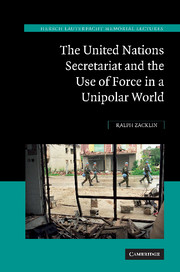Summary
In an interview with the BBC World Service on 16 September 2004, Secretary-General Kofi Annan said that the United States-led invasion of Iraq in 2003 had been an illegal act that contravened the United Nations Charter. The remarks which were teased out of him by a persistent interviewer provided an unexpected coda to a long-running saga, the origins of which could be traced back more than a decade.
The furore caused by these remarks in the United States was not due to the use of the word ‘illegal’ but to their timing. The characterization of the invasion of Iraq as illegal was hardly news. It is true that hitherto, the Secretary-General had done his utmost to avoid using so direct a condemnation of the war, but he had made it clear on numerous occasions that absent a specific authorization of the Security Council the use of force in the 2003 invasion of Iraq would not be and was not in conformity with Charter. The timing of the remarks, however, a few short weeks before a closely contested presidential election, had been seen by some in the Bush administration and by many in the neo-conservative community as a deliberate attempt to influence the outcome of the election.
It is doubtful, to say the least, that any Secretary-General would be rash enough to attempt to influence the outcome of an election in any Member State, least of all in the United States, but the BBC interview and the uses to which it was put by the media and the chattering classes, especially in the United States, demonstrated the vulnerability of high-level international officials to pressure from both inside and outside government.
- Type
- Chapter
- Information
- The United Nations Secretariat and the Use of Force in a Unipolar WorldPower v. Principle, pp. 1 - 6Publisher: Cambridge University PressPrint publication year: 2010

